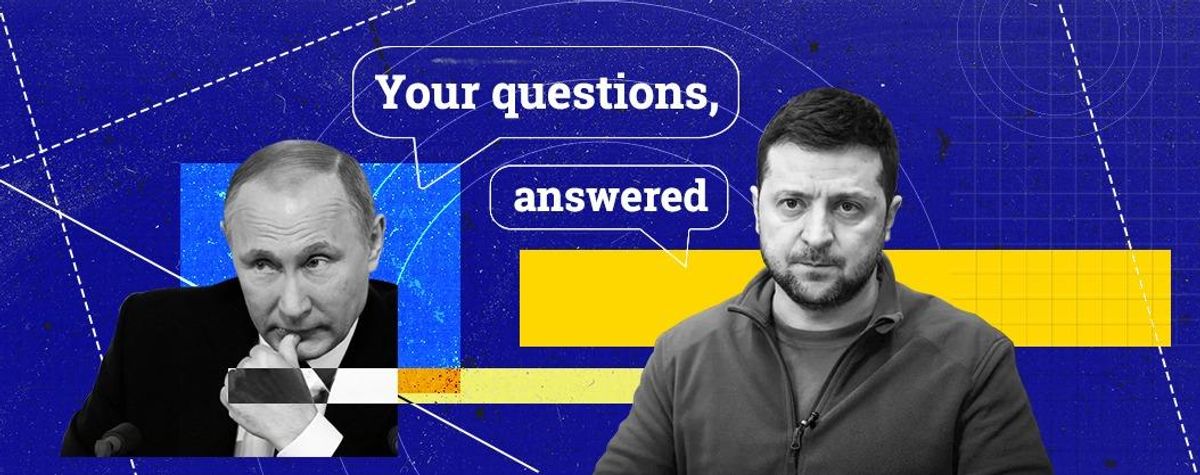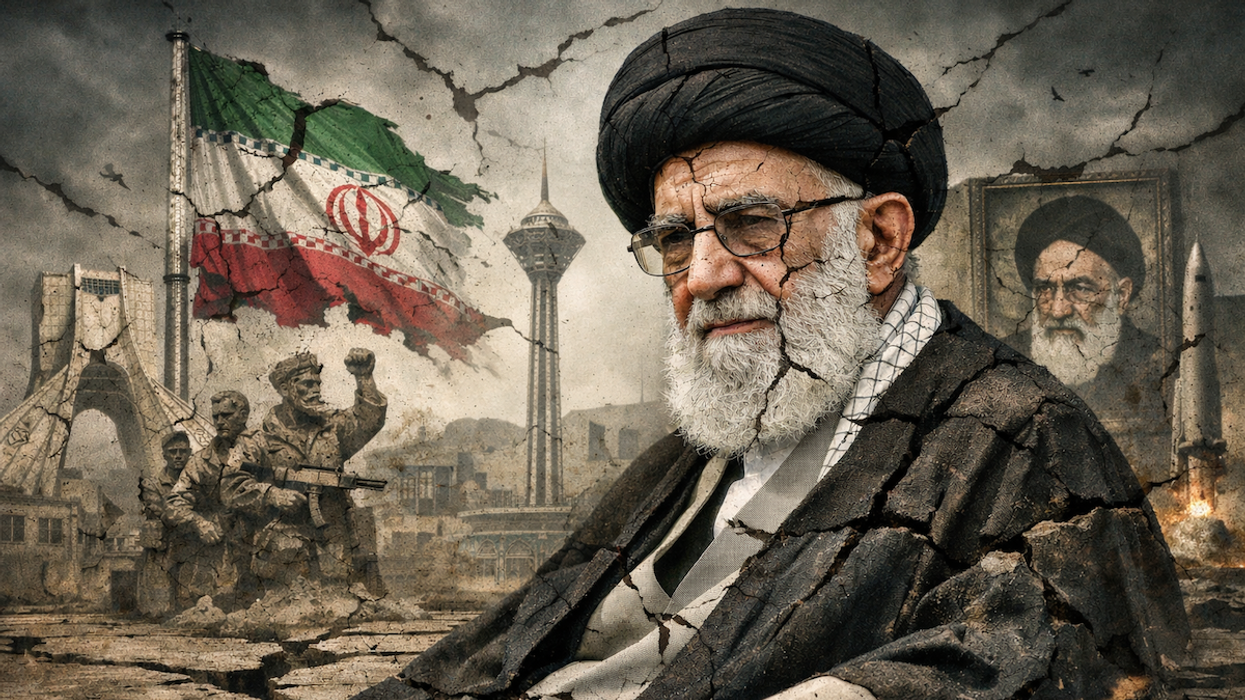One of the main reasons why I started this newsletter was to engage and argue directly with those who follow me online, on TV, and in print about the things that matter to them. While I read every comment that readers leave on my posts and do my best to respond to your questions, most of the time the rest of the world doesn’t get to benefit from our conversations. And that’s a damn shame, because I pride myself on having followers who ask very smart questions.
To remedy that, I’ve decided to start posting AMAs (“ask me anythings”) on a regular basis, starting with this one on the Russia-Ukraine war. You asked, I answer.
Note: This is the first installment of a four-part series responding to reader questions on Russia-Ukraine. You can find the second part here, the third part here, and the fourth part here. Some of the questions that follow have been slightly edited for clarity. If you have questions you want answered, ask them in the comments section below or follow me on Facebook, Twitter, and LinkedIn and look out for future AMAs.
Why is it that giving Ukraine artillery and weapons is no problem but providing aircraft is crossing the line? (Tanner)
You’re onto something. The line is artificial (though let’s face it, you have to draw one someplace). And it’s been shifting rapidly. A month ago, supplying Ukraine with offensive drones was seen as a no-go. Now the U.S. is sending tank-busting kamikaze drones. Two weeks ago, giving Ukrainians tanks was seen as crossing the line. Now Washington is working with NATO allies to transfer them Soviet-made tanks. And on Wednesday, the Biden administration approved $800 million in new military assistance for Ukraine, including helicopters, heavy artillery, and armored vehicles. Have the risks of crossing or moving the invisible “line” stayed the same or gone down just because the Ukrainians look like they’re winning? Or is there more danger that these repeated escalations from NATO lead to further escalation by Russia? Clearly, the answer is the latter.
Want to understand the world a little better? Subscribe to GZERO Daily by Ian Bremmer for free and get new posts delivered to your inbox every week.
If Russia uses chemical weapons in Ukraine, what will the US/NATO response look like? Will more sanctions alone be a viable response? If so, how much further damage can sanctions do to the Russian economy? (Ted N)
For starters, all Russian energy exports to Europe would get immediately cut off (yes, that includes German imports of gas). That’ll do quite a bit of damage to the Russian economy, but you still aren’t turning Russia into North Korea, because most of the developing world will continue to be reluctant to join in. In fact, it’s quite possible that no amount of Western sanctions is enough to deter or compel Putin. It’d probably also mean that the U.S. and a few other allies would take their gloves off when it comes to weapons transfers. But it’s unlikely you’re going to see NATO troops go in.
Will China start to distance itself from Russia (at least rhetorically) if the war becomes even bloodier? (Zagor T)
I’m skeptical. Putin and Xi Jinping’s worldviews are very aligned. Both of them view the U.S. as trying to contain them geopolitically and project influence in their respective regions. The reason why China is being careful not to violate Western sanctions and is not sending military support to Russia is that they don’t want to incur direct punishment from the U.S. Don’t mistake Chinese risk avoidance for ambivalence about Putin’s war.
Has the NATO calculation changed? Should Ukraine be a member of NATO now? (John B)
No, that hasn’t changed at all. There’s no way that Ukraine can become a NATO member now or in the near future. First, because accession while Ukraine is at war with Russia would automatically trigger article 5 and embroil NATO in a direct confrontation with a nuclear-armed power. And second, because however the war shakes up, it’s very likely that Russia and Ukraine will have unresolved territorial disputes for a long time to come, raising the potential for war in the future. This is not a problem NATO wants to own.
How do you think that Putin is likely to react if Finland and Sweden join NATO over the summer? (John W)
He’ll probably order some cyberattacks on their infrastructure and stage more and larger military exercises along Russia’s northern border. Maybe he’ll decide to open military bases in America’s backyard, in places like Venezuela, Cuba or Nicaragua, like he threatened to back in January. And he may deploy nuclear weapons in the Baltic Sea. But direct military intervention is almost inconceivable. His forces are stretched too thin in Ukraine as it is, so I seriously doubt he’d even have the capabilities to launch a two-front war that he could plausibly win. Finland and Sweden’s near-certain accession to NATO is a huge geopolitical own goal by Putin. He’s not in a position to deter them or punish them for it, and he knows it.
Is NATO membership enough to prevent a Russian attack, or will their nukes always scare away a full conventional military response? (Lawrence S)
It’s enough to seriously deter one… by conventional forces. But what about Russian espionage? Or disinformation attacks? Or active measures to subvert Western political systems? Or cyberattacks? The answer is no, because we’ve seen all of those happen already, and they will continue to.
If Ukraine is successful in fending off the Russian invasion, do you foresee any situation where Ukrainian forces go on a counter-offensive into Russian territory? (Joseph D)
It’s possible, and there’s apparently been at least one such incident when Ukrainian helicopters allegedly fired on a fuel depot in Belgorod. But if that starts happening systematically, a much more heavily-armed Russia will respond with incredibly dangerous escalation, leveling Ukrainian cities and potentially using chemical or biological weapons. It’s not something I’d advise the Ukrainians to try, both tactically and strategically.
How do you see this war ending? (Nart M)
It doesn’t look to me like the war is going to end. At best, we could see a frozen conflict between Russia and Ukraine if Russia manages to take much or all of the Donbas in the coming weeks, with rising casualties and exhausted forces on both sides but no possibility of meaningful negotiations. But I don’t think that ends the war. And it certainly doesn’t end the conflict between Russia and NATO, which will continue to isolate Russia economically, diplomatically, and culturally for as long as Putin remains in power.
I'm beginning to rethink whether Ukraine is a vital US interest as opposed to a vital NATO interest. What are your thoughts? Would you clarify the difference? (Eileen C)
I don’t see Ukraine as being strategically vital to either. Their safety and territorial integrity depend much more on the will of the United States to guarantee them than on anything Russia does or does not do in Ukraine. Ukraine is certainly more important to NATO than it is to the U.S., in the sense that NATO was weakening severely as an alliance before the invasion and now it isn’t. While the United States’ biggest problems remain internal (polarization, tribalism, and political dysfunction).
How do you stay hopeful during all this despair? I'm sure Moose helps a lot! (Eric F)
I’m an existential optimist. What did we do to deserve being here? It’s an extraordinary opportunity the cosmos has given us. I find it hard to even conceive of how unlikely it is that we exist and have awareness. Moose has it easier on this front...
 Moose (right) keeping me (left) calm.
Moose (right) keeping me (left) calm.
🔔 And if you haven't already, don't forget to subscribe to my free newsletter, GZERO Daily by Ian Bremmer, to get new posts delivered to your inbox.



















